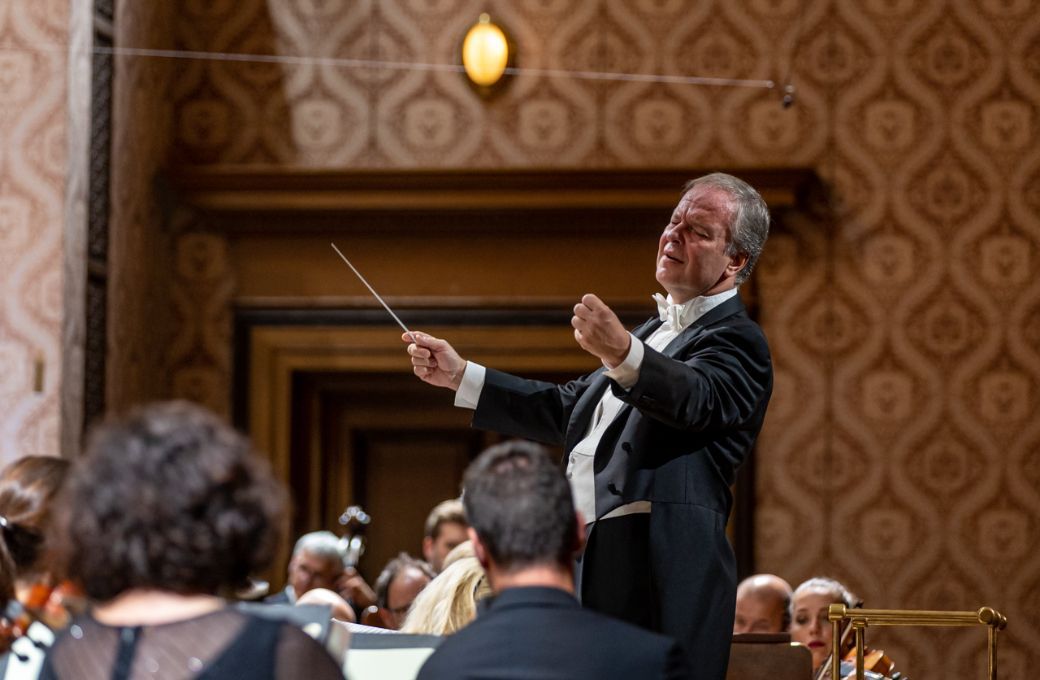Johannes Brahms is on half the orchestral programs at the Dvořák’s Prague festival this year, capped by an entire evening devoted to his daunting masterwork Ein deutsches Requiem. For this the festival assembled a stellar cast: Sakari Oramo conducting the Czech Philharmonic in their home hall, along with the Prague Philharmonic Choir and soloists Anu Komsi and Christian Senn. If the performance didn’t quite live up to the star billing, it wasn’t for lack of effort – or volume.

The title of the work is misleading. Brahms eschewed the standard liturgical text, instead cobbling together verses from the German Lutheran Bible for what is essentially a massive choral work with orchestral accompaniment and cameos by a soprano and baritone. While there are somber moments, the overall tone of this Requiem is triumphant, an affirmation of a heavenly afterlife, solace for the living rather than grief for the dead.
Oramo expanded the parameters even further with a symphonic approach that emphasized vivid contrasts, pulsing rhythms and dramatic climaxes. The low murmuring in the orchestra and gossamer choral threads that opened the piece quickly gave way to towering walls of sound that never abated, with the orchestra providing a full-blooded foundation for fiery vocals that rose in pitch and fever until they exploded off the stage. The blend of music and voices was seamless and superb. Propelling it all were timpani that set a driving pace in the second movement and never looked back.
While it was impossible not to get swept up in the fervor, ultimately it did not serve the piece well. As both the tempo and volume picked up, some details inevitably got lost and the timing slipped at points, the timpani slightly out of synch with the chorus. Sacred music never sounded so powerful and heavenly aspirations never reached higher, but with mostly one-dimensional dynamics, it lost depth and character.
For that one had to look to the soloists, who were outstanding. Senn has presence and perfect diction and a voice that was clear and strong enough to be heard above the orchestra. He brought dark expression to the entreaties of the third and sixth movements, ruminating in the latter, “Tod, wo ist dein Stachel?” (Death, where is they sting?) Komsi has a high, pure soprano with a captivating crystalline quality that was ideal for the comforting reassurances of the fifth movement. Buoyant, colorful support from the orchestra added to the uplifting quality of her sensitive singing. Her sole turn on the stage was all too brief.
The Prague Philharmonic Choir offered a reminder of why it sets the standard for choral quality in the Czech lands, though not with its usual finesse. The high-volume demands overwhelmed the usual shadings and subtleties in its sound, which reached electric intensity. Still, no one sings with such a distinctive combination of discipline and gusto.
To end the evening, relief: after a lustrous finale from the chorus, Oramo brought the Requiem in for a calm, peaceful landing. Echoing the opening theme and tone gave the piece a smart symmetry and a satisfying conclusion, a feeling of acceptance and reconciliation after all the emotional turmoil. If it all seemed overwrought at times, that was in keeping with the surfeit of Brahms in this year’s festival, and the boundaries waiting to be pushed and explored.


